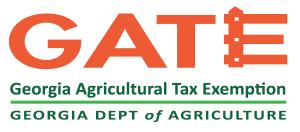Abuse it and lose it. Scary words for a farmer to hear mentioned about a program that’s vitally important to the farmer’s profitability. State leaders have issued this warning to producers since the implementation of the Georgia Agriculture Tax Exemption (GATE) program back in 2013. The reports of improper purchases with the GATE card are a commonly heard problem by state legislators. Whether or not these allegations are completely warranted, these accusations have caused GATE to come under increased scrutiny.
 For many farmers, the loss of sales tax exemptions on materials used to produce their commodities would mean the difference between profit and loss. The agricultural exemptions created by GATE give Georgia farmers the ability to compete, not only with farmers from surrounding states, but internationally. In 2012, the Georgia General Assembly recognized this by passing a major tax reform package (HB 386), which led to the eventual creation of the GATE program. Lawmakers understand how vital sales tax exemptions on inputs are to producers and the role agriculture plays in stimulating economic growth. But, lawmakers have made their intentions clear: the GATE card must be used properly.
For many farmers, the loss of sales tax exemptions on materials used to produce their commodities would mean the difference between profit and loss. The agricultural exemptions created by GATE give Georgia farmers the ability to compete, not only with farmers from surrounding states, but internationally. In 2012, the Georgia General Assembly recognized this by passing a major tax reform package (HB 386), which led to the eventual creation of the GATE program. Lawmakers understand how vital sales tax exemptions on inputs are to producers and the role agriculture plays in stimulating economic growth. But, lawmakers have made their intentions clear: the GATE card must be used properly.
Under the GATE program, a qualified agricultural producer receives a sales tax exemption on the inputs used to produce livestock and crops. Items such as seed, feed, fertilizer and equipment are often the largest expenditures a farmer incurs. Prior to the GATE program, many of these basic input exemptions were allowed under Georgia law. However, because of lax oversight, opportunities for abuse were created. For example, anyone could enter an agriculture supply store and purchase sales tax exempt items after signing an ST-A1 form.
The ST-A1 form was provided by the Department of Revenue, and there were no safeguards in place to require that only legitimate producers use them. GATE differs greatly from the old system because the program requires qualification by the Georgia Department of Agriculture (GDA). This qualification system requires an individual sign an affidavit pledging they produce $2,500 in agricultural products and pay a $25 application fee. While misuses still occur, the GDA has been proactive in making sure they remain controlled through improved screening procedures and program administration. So far, GDA has contacted nearly 10,000 GATE cardholders, resulting in more than 80 cards being revoked and several more cardholders relinquishing theirs voluntarily. In addition, GDA has rejected almost 100 new applicants due to increased screening procedures. Now, all new applications must be interviewed over the telephone with GDA staff. And over the next couple of years, GDA plans to conduct audits on all cardholders.
In 2014, the Georgia Department of Revenue (DOR) brought in two auditors dedicated to the GATE program. The goal for these auditors is to insure the items being purchased by cardholders are legitimate. A number of farms have already been audited but only minor infractions have been found. DOR Commissioner Lynn Riley confirmed these findings at a recent Georgia House Ways and Means Committee hearing. According to Riley, DOR has not found a significant number of abuses and most of the cases have been unintentional. The department now intends to focus more on retail facilities.
Georgia Farm Bureau and others in the agriculture industry have also been working diligently to maintain the GATE program’s integrity. Over the summer, a coalition of agriculture stakeholders have discussed various ways to reform the program to ensure legitimate producers have access to the program in the future. Consensus among the stakeholders was to increase efforts to educate cardholders and retail operators about the items that qualify. Prior Georgia law named specific agricultural items that were allowed for purchase, but under GATE, more general terms are now being used to identify the exemptions. This change was designed to prevent constant legislative changes when a new agricultural technology surfaces. The broader language is positive for producers, but also increases the likelihood for mistakes. Other ideas were discussed for stricter enforcement of the rules and increased punishment for violators.
No one disputes the benefits that GATE provides for the agriculture community, but the egregious cases of fraud and abuse by a few bad actors must be prevented. If agriculture is to remain the leading economic engine in this state, programs like this must be preserved and protected. Farmers have always prided themselves on being good stewards of their land and natural resources. Those same efforts must also apply to the programs that directly impact their bottom line. While many of the abuse allegations may be inaccurate, it is important for GFB to be proactive in protecting GATE for future generations of farmers.
For questions about the GATE program, please call 1-855-327-6829 or visit https://forms.agr.georgia.gov/GATE. To report abuse and GATE fraud, please call 1-877-423-6711.
This article was originally published by the Georgia Farm Bureau and written Jeffery Harvey, Legislative Director, Georgia Farm Bureau.

